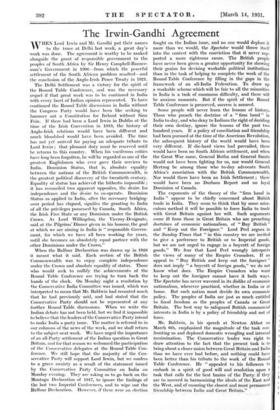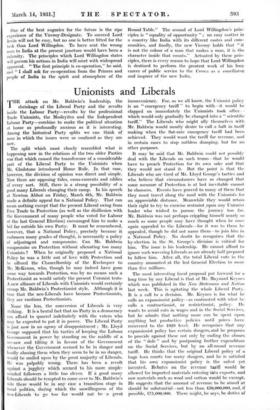The Irwin-Gandhi Agreement
WHEN Lord Irwin and Mr. Gandhi put their names to the truce at Delhi last week, a great day's work was done. The agreement is worthy to be ranked alongside the grant of responsible government to the peoples of South Africa by Sir Henry Campbell-Banner- man's Government in 1906—from which the peaceful settlement of the South African problem resulted—and the conclusion of the Anglo-Irish Peace Treaty in 1921.
The Delhi Settlement was a victory for the spirit of the Round Table Conference, and was the necessary sequel if that great work was to be continued in India with every facet of Indian opinion represented. To have continued the Round Table discussions in India without the Congress Party would have been like seeking to hammer out a Constitution for Ireland without Sinn Fein. If there had been a Lord Irwin in Dublin at the time of the Irish Convention in 1919, the history of Anglo-Irish relations would have been different and much bloodshed would have been avoided. The time has not yet arrived for paying an adequate tribute to Lord Irwin ; that pleasant duty must be reserved until he returns to this country. When his vociferous critics have long been forgotten, he will be regarded as one of the greatest Englishmen who ever gave their services to India. Dominion Status, that is, absolute equality between the nations of the British Commonwealth, is the greatest political discovery of the twentieth century. Equality of status has achieved the hitherto impossible ; it has reconciled two apparent opposites, the desire for independence and the desire to co-operate. Dominion Status as applied to India, after the necessary bridging- over period has elapsed, signifies the granting to India of all the privileges possessed by Canada, South Africa, the Irish Free State or any Dominion under the British Crown. As Lord Willingdon, the Viceroy-Designate, said at the Pilgrims' Dinner given in his honour, the goal at which we are aiming in India is " responsible Govern- ment, for which we have all been working for years, until she becomes an absolutely equal partner with the other Dominions under the Crown."
When the Balfour Declaration was drawn up in 1926 it meant what it said. Each section of the British Commonwealth was to enjoy complete independence under the Crown and absolute equality of status. Those who would seek to nullify the achievements of the Round Table Conference are trying to turn back the hands of the clock. On Monday night a resolution by the Conservative India Committee was issued, which was interpreted to mean that Mr. Baldwin had recanted much that he had previously said, and had stated that the Conservative Party should not be represented at any further Round Table discussions. When we write the Indian debate has not been held, but we find it impossible to believe that the leaders of the Conservative Party intend to make India a party issue. The matter is referred to in our columns of the news of the week, and we shall return to the subject next week. We have urged the importance of an all-Party settlement of the Indian question in Great Britain, and for that reason we welcomed the participation of the Conservative delegates at the Round Table Con- ference. We still hope that the majority of the Con- servative Party will support Lord Irwin, _but we confess to a grave anxiety as a result of the statement issued by the Conservative Party Committee on India on Monday evening. They are asking us to go back on the Montagu Declaration of 1917, to ignore the findings of the last two Imperial Conferences, and to wipe out the Balfour Declaration. However, if there were an election fought on the Indian issue, and no one would deplore it more than we would, the Spectator would throw itself into the contest with the conviction that it never sup- ported a more righteous cause.' The British people have never been given a greater opportunity for showing their genius for devising workable politiCal institutions than in the task of helping to complete the work of the Round Table Conference by filling in the gaps in the framework of an all-India Federation. To draw up a workable scheme which will be fair to all the minorities in India is a task of enormous difficulty, and there will be anxious moments. But if the spirit of the Round Table Conference is preserved, success is assured.
Some people will never learn the lessons of history. Those who preach the doctrine of a " firm hand " in India to-day, and who deny to Indians the right of deciding their own destiny, ignore the lessons of the past two hundred years. If a policy of conciliation and friendship had been pursued at the time of the American Revolution, the subsequent history of the world would have been very different. If die-hard views had prevailed, there would have been no South African settlement, and when the Great War came, General Botha and General Smuts would not have been fighting for us, nor would General Hertzog be among those who to-day advocate South Africa's association with the British Commonwealth. Nor would there have been an Irish Settlement ; there would have been no Durham Report and no loyal Dominion of Canada.
The exponents of the theory of the "firm hand in India " appear to be chiefly concerned about British trade in India. They seem to think that by some mira- culous method it will be possible to force India to trade with Great Britain against her will. Such arguments come ill from those in Great Britain who are preaching doctrines of economic nationalism, of " Buy British " and " Keep out the Foreigner." Lord Peel argues in the Sunday Times that " in this country we are invited to give a preference to British or to Imperial goods, but we are not urged to engage in a boycott of foreign goods." We fear that Lord Peel wrongly interprets the views of many of the Empire Crusaders. If an appeal to " Buy British and keep out the foreigner " does not imply " a boycott of foreign goods," we do not know what does. The Empire Crusaders who want to keep out the foreigner cannot have it both ways. The Spectator has never wavered in its dislike of economic nationalism, wherever practised, whether in India or at home. But each nation must decide its own economic policy. The peoples of India are just as much entitled to fiscal freedom as the peoples of Canada or Great Britain. The best way to safeguard British commercial interests in India is by a policy of friendship and not of force.
Mr. Baldwin, in his speech at Newton Abbot on March 6th, emphasized the magnitude of the task con- fronting us and deplored domestic wrangling and internal recrimination. The Conservative leader was right to draw attention to the fact that the present task is to bring about a closer union between Great Britain and India than we have ever had before, and nothing could have been better than his tribute to the work of the Round Table Conference. He " appealed to his followers to embark in a spirit of good will and resolution upon a task that calls for the best brains of the Party. if they are to succeed in harmonizing the ideals- of the East and the West, and of ensuring the closest and most permanent friendship betWeen India and Great Britain.'4 One of the best auguries for the future is the ripe experience of the Viceroy-Designate. To succeed Lord' Irwin will not be easy, but no one is better fitted for the task than Lord Willingdon. To have sent the wrong man to India at the present juncture would have been a calamity. The principles which Lord Willingdon states will govern his actions in India will Meet with widespread approval. " The first principle is co-operation," he said, and " I shall ask for co-operation from the Princes and people of India in the spirit and atmosphere of the Round Table." The second of Lord Willingdon's prin- ciples is " equality of opportunity " ; no easy matter in a country like India with its different castes and com- munities, and finally, the new Viceroy holds that " it is not the colour of a man that makes a man, it is the character inside that counts." Actuated by these prin- ciples, there is every reason to hope that Lord Willingdon is destined to perform the greatest work of his long career of public service to the Crown as a conciliator and inspirer of the new India.
























































 Previous page
Previous page